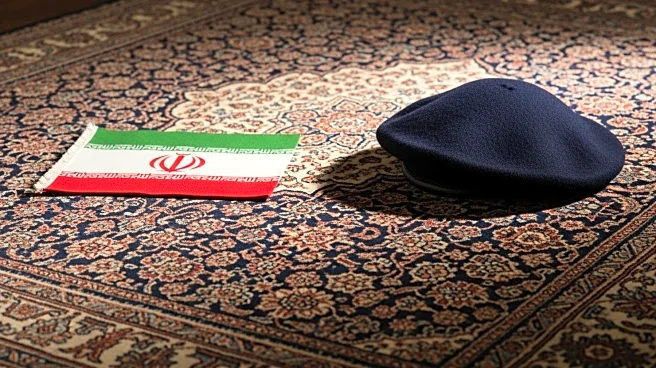What's Happening?
An Iranian court has sentenced two French nationals, believed to be Cecile Kohler and Jacques Paris, to lengthy prison terms on charges of espionage and national security violations. Kohler, 40, and Paris, 72, were arrested in May 2022 during a tourist trip and have been accused of spying for France and Israel. The court handed Kohler a six-year sentence for espionage, five years for conspiracy against national security, and 20 years in exile for intelligence cooperation with Israel. Paris received a 10-year sentence for espionage, five years for conspiracy, and 20 years in exile for complicity in intelligence cooperation. The sentences can be appealed to Iran’s Supreme Court within 20 days. France has accused Iran of arbitrary detention and torture-like conditions, which Iran denies. The case is part of broader diplomatic tensions, with Iran reportedly holding around 20 Europeans, including other French nationals.
Why It's Important?
The sentencing of Kohler and Paris highlights ongoing diplomatic tensions between Iran and Western nations, particularly France. The detentions are seen by human rights groups as leverage in diplomatic negotiations, with Iran often releasing detainees in exchange for concessions. This case underscores the precarious situation for foreign nationals in Iran, where they can be used as bargaining chips in international diplomacy. The broader implications include strained relations between Iran and European countries, potential impacts on tourism and international relations, and the human rights concerns associated with such detentions. The situation may influence diplomatic strategies and negotiations, as seen in previous cases where detainees were released following significant diplomatic agreements.
What's Next?
The sentences can be appealed within 20 days, potentially leading to further legal and diplomatic developments. France may increase diplomatic pressure on Iran to secure the release of Kohler and Paris, possibly through negotiations or international advocacy. The case could also affect Iran's relations with other European countries, especially if similar detentions continue. The broader geopolitical context may see increased scrutiny on Iran's judicial practices and its use of foreign nationals in diplomatic negotiations. The situation may also prompt discussions on international legal standards and human rights practices.
Beyond the Headlines
The detentions raise ethical and legal questions about the use of foreign nationals in diplomatic negotiations. The practice of holding individuals for leverage challenges international norms and human rights standards. The case may lead to increased advocacy for the rights of detainees and calls for transparency in Iran's judicial processes. It also highlights the risks faced by tourists and dual nationals in countries with strained international relations, potentially affecting global travel patterns and perceptions of safety.









